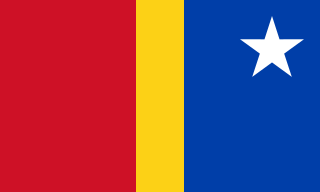Related Research Articles
Muhammad Zaki was a Sultan of Kano who reigned from 1582-1618.

Ibrahim Dabo was the leader of the Fulani Sullubawa in Kano and founder of the eponymous Dabo dynasty. His progeny has lasted over two centuries reigning as Muslim rulers of the ancient city-state of Kano. The dynasty has become synonymous with the ancient city-state in affectionate sayings as "Kano ta Dabo Cigari". They have independently ruled the Kano Emirate from 1819 until the Battle of Kano in 1903 which as a result of British colonisation transformed into the Kano Emirate Council.
Muhammad Dan Yaji, known as Muhammad Alwali II was the last sultan of the Sultanate of Kano. His reign coincided with a period of upheavals in Sudanic History that saw a series of religious Jihads waged by the Fula People. In 1807, after a protracted struggle with Fula clans, Muhammad Alwali was ambushed and assassinated at Burum-Burum in modern Kano. His death marked the end of the Kutumbawa line of Hausa aristocrats in Kano and the fall of the 800 year old Bagauda Dynasty.

The history of Katsina stretches over a millennium. It is part of the Hausa Bakwai states, believed to be founded by the descendants of Bayajidda according to legend. Throughout its history, Katsina has been governed by various dynasties, including the Wangarawa and the Dallazawa, and was a vassal to neighboring empires such as Songhai and Bornu.
Muhammad Dan Abdullahi, known as Muhammad Kisoki, was the Sultan of Kano from 1509 until his death in 1565. His 56-year reign is the longest of the state's Rumfawa era.
Abdullahi Dan Kanajeji, known as Abdullahi Burja, was the sixteenth ruler of Kano. Through forging of powerful alliances and the creation of trade routes, Burja shifted the identity of the Kano Sultanate towards trade and commerce, what Kano and its people are known for today. He was the first Hausa King to pay tribute to Bornu which secured an agreement to open trade routes from Gwanja to Bornu. He was also the first King to own camels in Hausaland. By the end of the 15th Century, Kano emerged as one of the most vibrant trading centers in the Sahel. Through trade, the Hausa language and culture was spread throughout the region.
Barandamasu Tsamiya Dan Shekarau, known as Tsamiya, was the King of Kano from 1307 until his death at the hand of his half brother Usman Zamnagawa in 1343.
Kabe Dan Kumbari, known as Alhaji Kabe, was the thirty-ninth ruler of the Sultanate of Kano, reigning for the ten-year period between 1743 and 1753. He was primarily remembered by the Kano Chronicle as a malevolent and ruthless King. It is said that no record can be kept of the number of battles and wars he fought or those fought by the subkingdoms of Kano by his orders, most notably against Gobir. The baleful nature of his reign led to the ousting of the already unpopular bloodline of Muhammad Sharefa.
Umaru was a Sultan of Kano who reigned from 1410 to 1421.
Dauda was a Sultan of Kano who reigned from 1421 to 1438.
Yakubu was a Sultan of Kano who reigned from 1463 to 1499.
Muhammad Shashere was a Sultan of Kano who reigned from 1573 to 1582.
Muhammad Nazaki was a Sultan of Kano who reigned from 1618 to 1623.
Soyaki was a Sultan of Kano who reigned in 1652.
Dadi was a Sultan of Kano who reigned from 1670 to 1703.
Muhammad Sharefa was a Sultan of Kano who reigned from 1703 to 1731.
Babban Zaki also known as Jan Rano was a Sultan of Kano who reigned from 1768 to 1776. One of the most significant rulers of the House of Kutumbi, he solved the puzzle of Kano's complex structure and provided the blueprint for its successful administration which would survive even after the fall of the Kutumbawa. Through the utilization of force and espionage, he created order out of chaos by pitting government officials against each other and disrupting communication channels between chiefs in the State to avoid organized revolts. He was also the first King to arm the Kano royal guard with muskets.
Sulaimanu was an Emir of Kano who reigned from 1807 to 1819.
Osumanu was an Emir of Kano who reigned from 1846 to 1855.
Abdullahi was an Emir of Kano who reigned from 1855 to 1883.
References
- ↑ Last, Murray (1980). "Historical Metaphors in the Kano Chronicle". History in Africa. 7: 161–178. doi:10.2307/3171660.
- 1 2 Palmer, Herbert Richmond, ed. (1908), "The Kano Chronicle", Journal of the Royal Anthropological Institute of Great Britain and Ireland , vol. 38, pp. 58–98 – via Internet Archive; in Google Books.
 This article incorporates text from this source, which is in the public domain .
This article incorporates text from this source, which is in the public domain .
